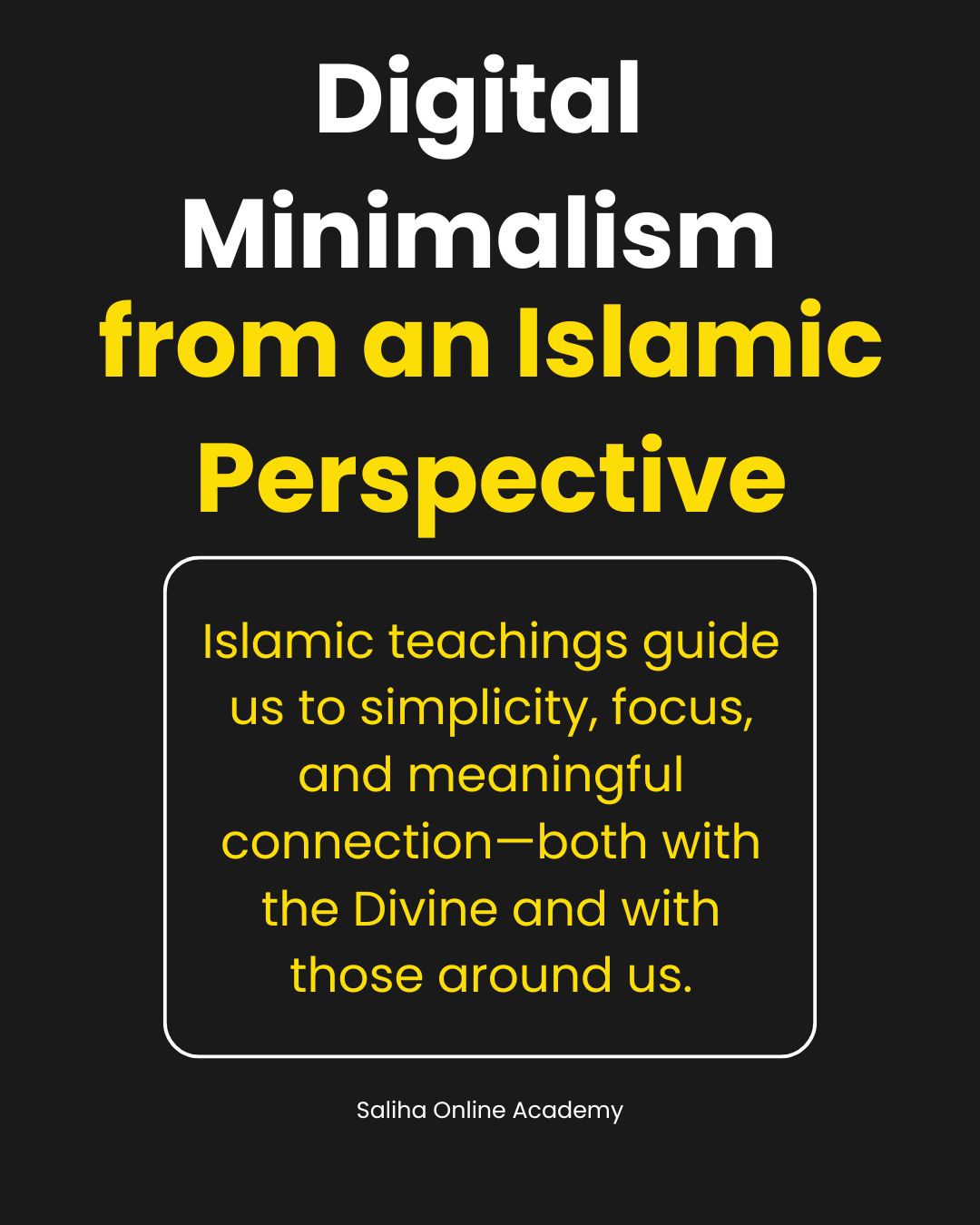Finding Balance in a Connected World
In today’s hyper-connected digital age, where smartphones, social media, and constant notifications dominate daily life, many people struggle to find peace and focus. Digital minimalism—a lifestyle choice focused on intentional and mindful use of technology—offers a way to reclaim time, attention, and well-being. When viewed through the lens of Islamic teachings, digital minimalism aligns naturally with the principles of balance, purpose, and self-discipline that are central to a Muslim’s life.
What is Digital Minimalism?
Digital minimalism is the practice of intentionally limiting the use of digital devices and platforms to what truly adds value to one’s life. It encourages cutting down on mindless scrolling, excessive screen time, and distractions that reduce productivity, mental clarity, and spiritual focus. Instead, digital minimalism promotes purposeful engagement with technology for meaningful communication, learning, and work.
The Islamic Call for Balance and Moderation
Islam advocates a balanced life, avoiding excess in all forms. The Quran repeatedly emphasizes moderation (Wasatiyyah) in behavior, consumption, and lifestyle. The Prophet Muhammad (peace be upon him) modeled a life of moderation, neither indulging in excess nor falling into extreme austerity. This principle applies directly to the digital realm.
Overuse of digital devices can lead to neglect of worship, family, and community responsibilities. It can also contribute to anxiety, distraction, and reduced productivity—all of which hinder a Muslim’s ability to fulfill spiritual and worldly duties. By embracing digital minimalism, Muslims can maintain a healthy balance between the physical and digital worlds, enhancing their relationship with Allah and those around them.
Key Islamic Values Supporting Digital Minimalism
1. Time Management and Accountability:
The Quran reminds believers that time is a precious gift. Muslims are accountable for how they spend their time, as it impacts their deeds and hereafter. Digital minimalism encourages intentional time use, reducing time wasted on unproductive digital distractions, thus allowing more time for prayer, reflection, and good deeds.
2. Avoiding Wastage and Distraction:
Islam teaches against Israf (wastage) in all forms, including time and attention. Excessive use of social media or digital entertainment often results in neglect of important obligations. Practicing digital minimalism helps avoid these distractions, keeping the mind focused on beneficial activities and spiritual growth.
3. Preservation of Mental and Spiritual Health:
The Prophet Muhammad emphasized taking care of both body and soul. Constant exposure to digital content—much of which can be negative, harmful, or trivial—can lead to anxiety, stress, and spiritual weakness. By limiting digital consumption, Muslims can protect their hearts and minds from unnecessary harm.
Practical Steps to Practice Digital Minimalism Islamically
· Set Intentions Before Use: Before engaging with any device or app, ask: “Is this beneficial? Will this bring me closer to my goals or faith?” This helps prioritize meaningful digital interactions.
· Schedule Screen-Free Times: Dedicate specific periods during the day for worship, family time, and reflection without digital interruptions. This aligns with the Islamic practice of regular prayers and mindful living.
· Limit Social Media Consumption: Follow accounts that provide beneficial knowledge, inspiration, or positive connection. Unfollow or mute sources that distract or cause negativity.
· Engage in Offline Activities: Replace excessive screen time with reading Quran, volunteering, exercising, or spending quality time with loved ones. The Prophet’s life was full of social and physical activities, setting a model for balanced living.
· Practice Gratitude and Contentment: Reflect on Allah’s blessings rather than comparing oneself to others on social media, which often fuels dissatisfaction and envy.
Digital Minimalism and Spiritual Growth
Digital minimalism supports spiritual growth by allowing Muslims to focus on their relationship with Allah without constant distractions. Reduced screen time means more focus during Salah (prayer), more time for Quranic study, and increased mindfulness throughout the day. It cultivates a heart free from unnecessary attachments to worldly digital distractions, nurturing sincerity (Ikhlas) in worship.
Conclusion
From an Islamic perspective, digital minimalism is not just a lifestyle trend but a practical approach rooted in the faith’s core values of balance, discipline, and purpose. By consciously limiting digital consumption, Muslims can protect their time, mental health, and spiritual well-being. Embracing digital minimalism empowers believers to live intentionally, strengthen their faith, and make the most of every moment granted by Allah. In a world overflowing with digital noise, Islamic teachings guide us to simplicity, focus, and meaningful connection—both with the Divine and with those around us.
- Info@salihaonlineacademy.com
- Chaman Zar Colony, Rawalpindi
- Sunrise At: 5:15 AM
- Sunset At: 4:50 PM
- Let’s Talk +923301790195


Leave A Comment